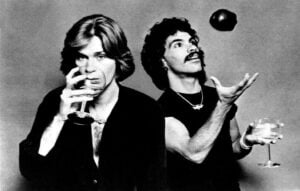5 Classic Progressive Rock Bands That Survived 80s Pop Era

via Genesis/YouTube
When you hear the term “progressive rock,” you typically think of long, complex songs from the 1970s—not the massive pop singles of the 1980s. However, certain prog rock bands not only survived the 1980s—they thrived. These five bands transitioned from renowned prog rock acts to pop stars, which is a significant achievement. Here’s how they did it.
1. Asia: A Supergroup with Big Hooks
Asia may seem like a band that arrived a little late to the party (they were formed in 1981), but their lineup was anything but new. They excelled at prog rock because they included members from King Crimson (John Wetton), Yes (Steve Howe and Geoff Downes), and Emerson, Lake & Palmer (Carl Palmer). However, they shook things up by tightening their songs and emphasizing catchy hooks. The result? Major 1980s hits like “Heat of the Moment” and “Only Time Will Tell.” Their sound—a great blend of prog and pop—propelled them straight to the top of the charts.
2. Yes: From Prog Giants to Pop Chart-Toppers
Yes was always a band known for frequent lineup changes. In 1980, they collaborated with Trevor Horn and Geoff Downes of the Buggles, with Horn staying on to produce their 1983 album 90125. New guitarist Trevor Rabin introduced fresh ideas, including the massive hit “Owner of a Lonely Heart.” The song soared to number one with its catchy melodies and anthemic chorus, making Yes a household name. After years of perfecting their complex sound, the band embraced a more pop-friendly style—a pivotal moment in their career.
3. The Moody Blues: MTV Meets Orchestral Prog
The Moody Blues were pioneers of orchestral prog rock, blending rock with classical music on albums like Days of Future Passed. By the 1980s, however, they struggled to remain relevant in a rapidly evolving music scene. Then came “Your Wildest Dreams.” The 1986 hit was a sentimental ballad that rekindled memories of the band’s earlier brilliance while offering something new. The song not only charted successfully but also helped the Moody Blues establish a presence in the MTV era, returning them to the Top 10.
4. Rush: A Pop Hit That Came Out of Nowhere
Rush was already a major band in the 1970s, but was not known for scoring Top 40 hits. Everything changed in 1982 with “New World Man,” a song they nearly excluded from Signals. The track was catchy, radio-friendly, and unlike anything they had previously released. It became their first Top 40 hit in the U.S., surprising fans and critics alike. This proved that even a hard-hitting prog band like Rush could succeed in the pop arena.
5. Genesis: From Prog Rock Kings to ’80s Stars
Peter Gabriel was the original lead singer of Genesis, a legendary prog band known for ambitious albums like The Lamb Lies Down on Broadway. After Gabriel’s departure, Phil Collins took over lead vocals, and the band’s sound shifted dramatically. Collins’ solo career flourished, and Genesis followed suit, moving toward a more mainstream style. With the release of Invisible Touch in 1986, Genesis was no longer a cult favorite—they had become major stars, topping charts and dominating ’80s radio.

















